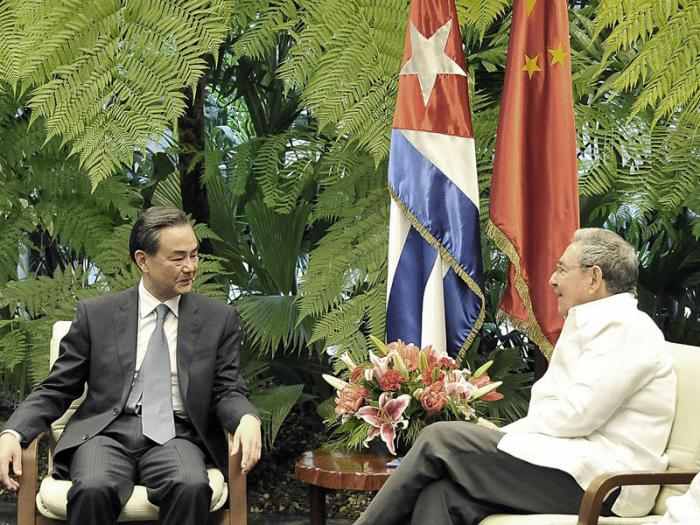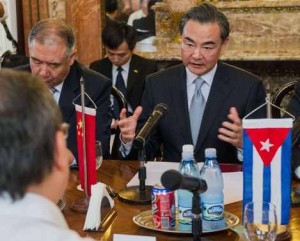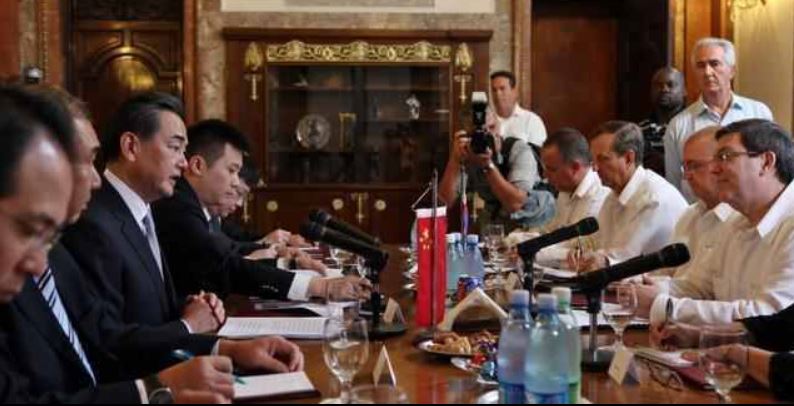
Chinese foreign minister meets with Castro
Cuban President Raúl Castro met Sunday (April 20) in Havana with China’s foreign minister, Wang Yi, in an encounter described by state-run television as an expression of “the excellent state of bilateral relations that continue to strengthen, with the outlook of greater development.”

The “fraternal exchange,” Cuban TV said, was evidence of “the ties of brotherhood that join both peoples and governments.” Present were Cuban Foreign Minister Bruno Rodríguez Parrilla; Shen Zhiliang, the Chinese foreign ministry’s director general for Latin America and the Caribbean, and Zhang Tuo, China’s ambassador to Cuba.
From 2010 to 2012, Shen was China’s ambassador to Bolivia. He has held diplomatic posts in Spain, Venezuela and Mexico.
Before his assignment to Cuba, Zhang was China’s ambassador to Venezuela,
Argentina and Bolivia, and held diplomatic posts in Spain.
Wang was to leave Cuba for Venezuela Sunday night. He will also visit Argentina and Brazil, in preparation for the tour of Latin America that Chinese President Xi Jinping will make in July. Xi visited the island once before, in June 2011, while he was vice president of China.
Xi’s predecessor, Hu Jintao, visited Cuba in November 2008; President Castro visited China in July 2012.
Earlier Sunday, Wang and his staff met with Rodríguez Parrilla at the Foreign Ministry. The official statement from the MINREX said that “both ministers congratulated each other for the excellent state of the bilateral relations and underlined the importance of this visit as an expression of the strengthening of the political dialogue between both nations.”
“Also, in a fraternal environment, they analyzed a broad bilateral agenda, the preparations for the official visit of President Xi Jinping, and aspects of the international situation that are of mutual interest.”
“Wang Yi was grateful for Cuba’s contribution to the implementation of the China-CELAC Forum, approved during the Second Summit of CELAC, held in Havana,” the statement continued. “For his part, Rodríguez Parrilla reiterated the gratitude of the Cuban people for the Chinese People’s Republic’s unequivocal support in the struggle against the blockade by the United States against the island.”
Rodríguez and Wang had met once before, in Beijing last November.
Other MINREX officials present at that meeting were Rogelio Sierra Díaz, Deputy Foreign Minister; Gerardo Peñalver Portal, Director General of Bilateral Affairs, and Pedro Núñez Mosquera, Director General of Multilateral Affairs and International Law.
China is Cuba’s second trade partner after Venezuela, and a major source of credit, as well as a political ally. Bilateral trade totaled $1.7 billion in 2012. Between January and August 2013, it reached $1.4 billion, a 25 percent increase over the same period in 2012.
Bilateral trade between Cuba and Venezuela totaled $8.5 billion in 2012, according to Cuba’s National Statistics Office.
Felipe Pagliery has contributed to Progreso Weekly in the past. He will follow Cuba on the world stage and is now reporting for Progreso on a regular basis.
[What follows is the Wang Yi visit to Cuba as reported by the Chinese newspaper Xinhua.]
Minister’s visit, reported in Beijing
HAVANA, April 20 (Xinhua) — Chinese Foreign Minister Wang Yi said on Sunday that China will promote bilateral relations and enhance mutually beneficial cooperation with Cuba.
Wang made the remarks while meeting separately with Cuban leader Raul Castro and Foreign Minister Bruno Rodriguez during a visit to Havana, the first stop of his Latin America tour.
Wang said that China and Cuba are good friends, comrades and brothers, and the continuous development of a comprehensive friendly relationship with Cuba is China’s steadfast diplomatic policy.
China is ready to carry on the traditional friendship and promote high-level exchanges with Cuba, he said.
Wang urged the two countries to translate the strength of their high-level political relationship into concrete results of mutually beneficial cooperation and further promote exchanges on their respective experience in governance.
He also called for enhanced bilateral cooperation in such key areas as trade, investment, agriculture, infrastructure, energy and mining, saying the two sides need to foster new growth points in cooperation in tourism, renewable resources and bio-technology.
They should also staunchly support each other’s search for a development path suited to their respective national conditions, he said.
Additionally, China and Cuba need to strengthen coordination in global and regional affairs, and China believes that Cuba will continue to play a positive and constructive role in promoting the development of the China-Latin America relationship, Wang added.
Castro, for his part, agreed that Cuba and China enjoy a profound traditional friendship and high-level mutual political trust.
Cuba is willing to promote practical cooperation in various areas with China and deepen bilateral exchanges on national construction experience, thus pushing bilateral ties to new heights, said Castro.
Rodriguez said that Cuba is willing to expand its practical cooperation with China in economy and trade, as well as investment.
Wang’s four-nation Latin America tour will also take him to Venezuela, Argentina and Brazil.


